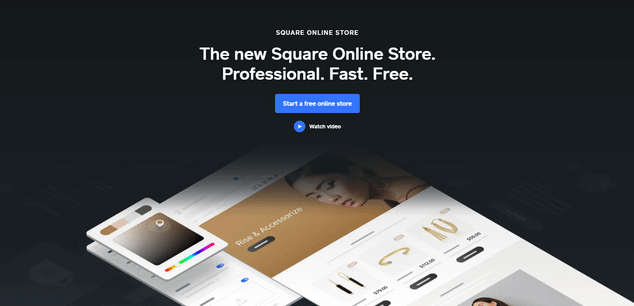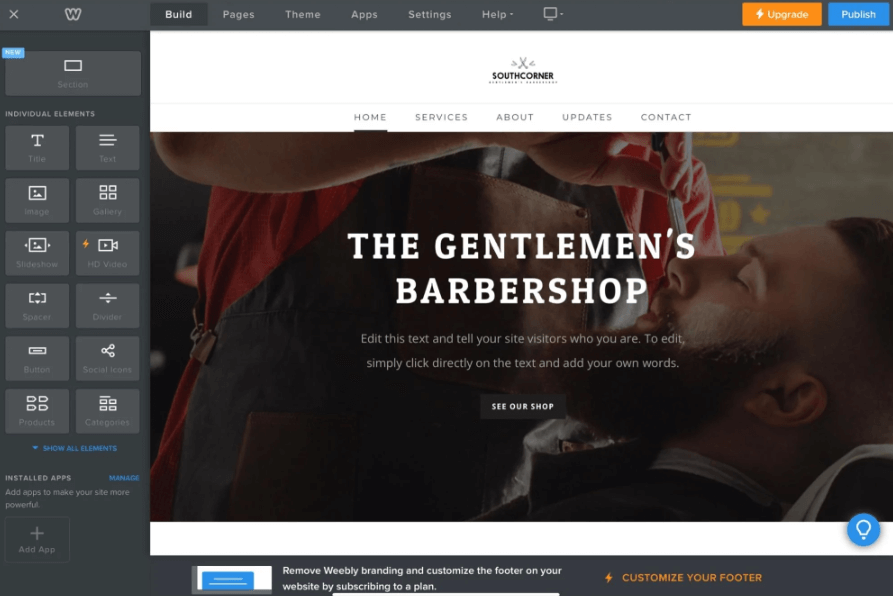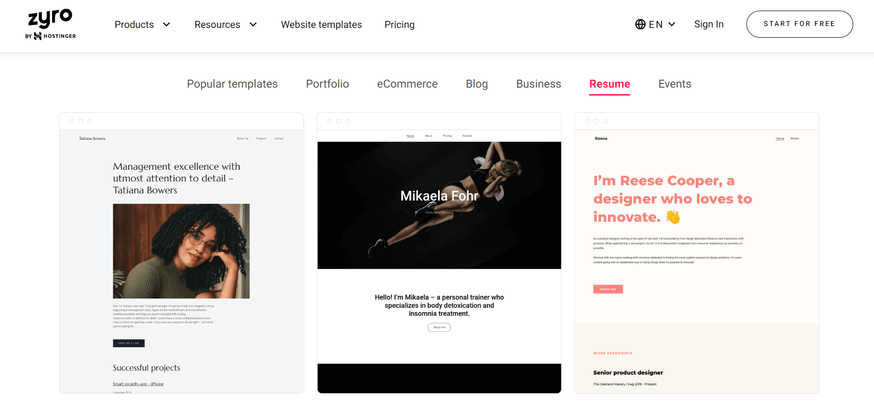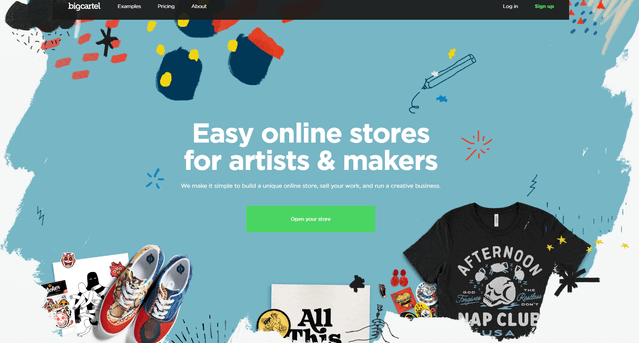There are many sorts of website builders on the internet. Some website builders have top-notch metrics and features while others let you use your creativity to the fullest. However, there aren’t many options to choose from for freebies. But, many websites provide a free trial so you can potentially earn enough in the trial to pay off your first premium.
A List of 7 Best Ecommerce Website Builders for Small Businesses in 2023
Have a look at the below-mentioned top 7 Ecommerce Website Builders that you can consider in 2023 to kick-start your business online. Without further ado, let’s get started! Wait for a second! There are many good Ecommerce website builders present on the internet. But, the question is, which one is best for you? If an eCommerce website maker suits your business needs and budget, it inadvertently becomes the best choice. However, there are some other factors as well that you should consider before spending even a penny! Which are: Convenience: An ideal eCommerce website builder should be user-friendly and easy to use. It should have drag-and-drop functionality and in-depth step-by-step tutorials to boost your learning and get you started. Technical Support: While building your eCommerce store, there’s a pretty high chance that you’ll bump into some problem and need tech support right away. So, It’s wiser to opt for a website builder that provides 24/7 technical and customer support. Free Trial: A free trial helps you to make a prudent assumption of what to expect from a potent eCommerce website builder and vice versa. Pricing: Mostly, there are different pricing plans for different websites, based on the features and services provided. Make a note to compare pricing plans before selecting the best eCommerce website builder.
1. Wix
Wix provides an abandoned cart recovery feature, that sends out an email to the customer when they’ve registered an email and added products to the cart and hadn’t made any changes to the cart in an hour. You can also look at what a customer has in their cart with a single click on the ‘Abandoned Cart’ tab on your dashboard. You need a paid Wix plan to sell online. The plans start at $27 per month and come with 50GB of storage space. 24/7 customer support, social selling, and custom domains are some other additional perks. Wix also provides a free plan but not for an eCommerce website. Visit Now
Sell subscription-based productsAbandoned cart recoveryAd vouchersUnlimited productsSelling on social media
Limited storage for most plansLimited hours for videos
Also Read: Ways to Improve eCommerce Shopping Cart Conversion Rates
2. Square Online
Square Online comes with a free version that provides features like unlimited products, omnichannel selling, placing orders via QR, multi-shipment & delivery options, etc. It syncs with Square POS as well. The free trial for the paid plan is of 30-days which starts at $12 monthly and is billed annually. If you want a custom URL, a paid version is needed. Even in the free version, Square Online gives you access to Afterpay. It’s a pay-in-four option for your customers. The seller(you) immediately get access to the funds (minus a small fee), & the customer/clients get their products. Afterpay speculates the risk, gives the initial customers a small amount to borrow, and increases that amount after each purchase. Using Afterpay requires a cart minimum of $35. You can accept any sort of online payment or donation too. Visit Now
SEO toolsDiscounts on shipping and deliveryAllows AfterpaySocial media sellingUnlimited products that too in the free plan
Custom URL requires a paid planProcessing fees are relatively higherYou’ll have ads unless you have a paid plan
3. Weebly
Weebly, powered by Square is one of the best eCommerce website builders and is quite simple to use. Weebly offers both free & paid versions. The free version consists of unlimited physical products, coupons, inventory management, a tax calculator, SEO tools, etc. Upgrade to a paid plan for phone support, pop-up notification, shipping labels, and so on. The paid version starts at $6 per month when billed annually. With a paid plan, you get a custom domain name, digital products, a shipping calculator, shipping labels, and pop-up notifications. Premium plans let you delete Square ads and give unlimited storage, allow you to accept PayPal, and get tech support. Visit Now
Free of cost SSL certificateOffer in-store pick upUse coupons and gift cardsCapture leads
Paid plan for custom domainYou’ll have Square ads unless you have a paid plan
4. Shopify
Shopify is one of the most popular and best eCommerce website builders. Merchants have access to an entire gamut of integrations including dropshipping, using which you can sell products without ever stocking up or taking on inventory. Every plan lets you sell on social media and other online bazaars. Shopify’s free trial consists of a free 14-day trial. After that, paid plans start at $5 per month. The cheapest Shopify plan doesn’t complement a full-fledged eCommerce store and only lets you sell through social and messaging apps. The next plan in the lineage costs $29 per month and gives access to an online store, POS software, 24/7 tech support, and omnichannel selling. Visit Now
Design for selling onlineVarious integrationsCan dropship with integrations such as Refersion or LeadDynoMultiple inventory locations
The free plan isn’t truly freeTransaction fees are applied while using third-party payment providers
Also Read: Best Free Drag and Drop Website Builder
5. Zyro
If you’re a UX enthusiast and business hobbyist, Zyro is the perfect match for you. Zyro also enables POS integration which facilitates the alignment of hardware and software to drive customer purchases via online checkout. With Zyro’s robust design editor, you can create gorgeous storefronts in the blink of an eye. Without a doubt, Zyro is one of the best eCommerce website builder platforms and packages some great features. However, many users have mentioned that it’s rather difficult to hunt down these features in the builder. Zyro’s business plan starts at $4.24 per month. They also do weekly discounts of 72% and 80% for the yearly and twice-yearly plans. Visit Now
Logical and clean templatesOffers great UXProvides integration with POS software
No free trialFaulty integrations among interfaces
6. Big Cartel
Big Cartel is among the very few sites that let you build, publish, and even sell free of cost. While most eCommerce website builders ensure you have a paid plan to sell, Big Cartel gives it for free. However, the features in their free plan are basic and trivial. And, won’t make you an eCommerce giant in the long run. We only recommend Big Cartel if you’re a small business owner or just trying your luck in the eCommerce domain. The best thing about Big Cartel is its affordable pricing policies. And, the worst thing is its value for money. Even in the paid plans, you get limited features which are enough to discourage anyone. Visit Now
Offers a free planDesigned for products as well as artUser-friendly interface
Limited features even in the paid plansLacks scalabilityAllows mere five products on the free plan
7. Shift4Shop
Shift4Shop is the complete opposite of Squarespace in terms of design and creativity. This eCommerce website builder relies on robust back-end tools and great inventory features. Although, Shift4Shop might not be a great prospect for a creative person. Shift4Shop comes with a gamut of great sales tools that saves you from the costs of other applications which get rather high after piling up. Shift4Shop’s paid plans start at $29 per month, at par with Shopify’s lowest plan which suggests you are getting more value for your money elsewhere. Visit Now
Great inventory management systemChange the theme anytimeSEO prompting
Least liked by the usersNo mobile appThe worst option for designers and creatives
Also Read: Competitor Tracking Tools to Spy on Your Competition
Final Words
Here, we’d like to end our list of the seven best ecommerce website builder platforms. The builders mentioned above can be a good fit for every class of users. This list has options for both – an enterprise owner or someone trying luck in ecommerce. Assess each platform well before choosing a single option. Was this information helpful? Please let us know in the comments below. Additionally, you can also drop your queries or further doubts. For more tech-related information, you can subscribe to our Newsletter and follow us on Facebook, Twitter, Pinterest, & Instagram.






